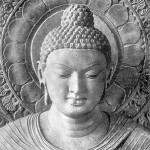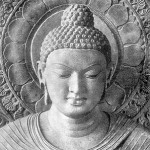 Lojong is a mind training practice in the Tibetan Buddhist tradition originating in Tibet in the 12th century by Chekawa Yeshe Dorje. The practice involves refining and purifying one’s motivations and attitudes. We discussed the 7 point mind training with John Wenz February and Lama Gursam February 2016 and will continue in March with The Root Text of the Seven Points of Training the Mind by Chekawa Yeshe Dorje
Lojong is a mind training practice in the Tibetan Buddhist tradition originating in Tibet in the 12th century by Chekawa Yeshe Dorje. The practice involves refining and purifying one’s motivations and attitudes. We discussed the 7 point mind training with John Wenz February and Lama Gursam February 2016 and will continue in March with The Root Text of the Seven Points of Training the Mind by Chekawa Yeshe Dorje
Point One: The Preliminaries, Which Are a Basis for Dharma Practice
- First, train in the preliminaries.
Point Two: The Main Practice, Which is Training in Bodhichitta
Absolute Bodhichitta
- Regard all dharmas as dreams.
- Examine the nature of unborn awareness.
- Self-liberation even the antidote.
- Rest in the nature of alaya, the essence.
- In postmeditation, be a child of illusion.
Relative Bodhichitta
- Sending and taking should be practiced alternately, these two should ride the breath.
- Three objects, three poisons, and three seeds of virtue.
- In all activities, train with slogans.
- Begin the sequence of sending and taking with yourself.
Point Three: Transformation of Bad Circumstances into the Path of Enlightenment
- When the world is filled with evil, transform all mishaps into the path of Bodhi.
- Drive all blames into one.
- Be grateful to everyone.
- Seeing confusion as the four kayas is unsurpassable shunyata protection.
- Four practices are the best of methods.
- Whatever you meet unexpectedly, join with meditation.
Point Four: Showing the Utilization of Practice in One’s Whole Life
- Practice the five strengths, the condensed heart instructions.
- The Mahayana instruction for ejection of consciousness at death is the five strengths: how you conduct yourself is important.
Point Five: Evaluation of Mind Training
- All dharma agree at one point.
- Of the two witnesses, hold the principal one.
- Always maintain a joyful mind.
- If you can practice even when distracted, you are well trained.
Point Six: Disciplines of Mind Training
- Always abide by the three basic principles.
- Change your attitude, but remain natural.
- Don’t talk about injured limbs.
- Don’t ponder others.
- Work with the greatest defilements first.
- Abandon any hope of fruition.
- Abandon poisonous food.
- Don’t be so predictable.
- Don’t malign others.
- Don’t wait in ambush.
- Don’t bring things to a painful point.
- Don’t transfer the ox’s load to the cow.
- Don’t try to be the fastest.
- Don’t act with a twist.
- Don’t make gods into demons.
- Don’t seek others’ pain as the limbs of your own happiness.
Point Seven: Guidelines of Main Training
- All activities should be done with one intention.
- Correct all wrongs with one intention.
- Two activities: one at the beginning, one at the end.
- Whichever of the two occurs, be patient.
- Observe these two, even at the risk of your life.
- Train in the three difficulties.
- Take on the three principal causes.
- Pay heed that the three never wane.
- Keep the three inseparable.
- Train without bias in all areas. It is crucial always to do this pervasively and wholeheartedly.
- Always meditate on whatever provokes resentment.
- Don’t be swayed by external circumstances.
- This time, practice the main points.
- Don’t misinterpret.
- Don’t vacillate.
- Train wholeheartedly.
- Liberate yourself by examining and analyzing.
- Don’t wallow in self-pity.
- Don’t be jealous.
- Don’t be frivolous.
- Don’t expect applause.
Chodron, Pema. Start Where You Are. Shambala, 1994 (pp. 145-147); Be Grateful to Everyone: An In-depth Guide to the Study of Lojong, Shambala Audio, 2014; Trungpa, Chogyam. Training the Mind and Cultivating Loving Kindness, Shambhala, 2004; Wallace, B. Alan. Buddhism with an Attitude: The Tibetan Seven-Point Mind-Training, Snow Lion, 2003; Kongtrul, Jamgon and McLeod, Ken. The Great Path of Awakening. Shambala, 2005.




